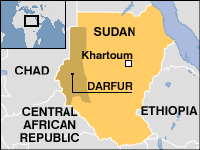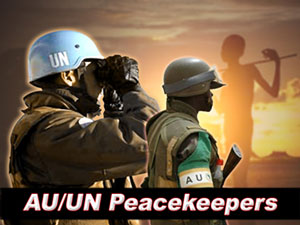African Union High Level Panel on Darfur - A Blueprint For What Plagues Africa
By Jehron Muhammad | Last updated: Dec 14, 2009 - 3:52:55 PMWhat's your opinion on this article?

|
In the recently released findings of the African Union High Level Panel On Darfur (AUPD) chaired by the former South African president Thabo Mbeki and commissioned by the African Union, I discover that the 24-helicopters promised nearly two years ago and lobbied for by then Senator Joe Biden have never seen the light of day. And this from an administration that accuses the Sudanese government of “genocide,” refuses to assist UNAMID in acquiring helicopters to secure the region. I guess Vice President Biden, who could be seen on morning news programs capitulating on his anti sending of more troops to Afghanistan position, must of been also required to forgo the security of Darfur. Contrary to public opinion, Darfur, according to the Mbeki report, has depended upon much of its support from the African Union – thus it seems only fitting that the AU's home base country of Ethiopia is sending five much needed helicopters to patrol the vast area that Darfur encompasses.

|
“They're (UNSC) extremely upset,” said Mbeki, “because we didn't deliver a report stating that a bloody war was taking place. There is still a low-intensity war going on, since there has been no peace agreement yet. People who allege otherwise, are creating their own convenient and self-justifying reality,” he said at an address recently at the University of Pretoria's Faculty of Law.
Others see the 126-page report as a way to bypass the International Criminal Court's (ICC) indictment of Sudan President Omar Al-Bashir.
News reports suggest that the timing of the formulation of the AUPD just weeks ahead of the ICC indictment against Bashir has fueled speculation of a kind of preemptive strike by the AU. On top of that, AUPD member and former Egyptian foreign minister Ahmed Maher El Sayed remarks in support of Bashir didn't help.
“Incriminating the president is out of the question and fundamentally unacceptable” he said while being interviewed by the Egyptian based Al-Masry Al-Youm newspaper.
“Our goal was to find a way out (for Bashir) from the dilemma of the ICC that sparked a great deal of controversy,” Maher said.
The AUPD chair was reported to be furious. Mbeki's response included a strongly worded letter protesting Maher's remarks.
Sudanese political analyst Abdel-Wahab El-Effendi who traveled with the panel and Dr. Alex De Waal one of the panel's advisors both corroborated the above with the later writing that people “should examine the record of Minister Maher's participation in the activities of the Panel. I did not see him a single time in Darfur or Khartoum.”
Richard Dicker, International Justice Program director at Human Rights Watch also weighed in suggesting that the AUPD's call for “a hybrid court and national law reforms could potentially help,” and at the same time all but dismissingly warning that this could “not substitute the ICC's cases.” This is actually a misrepresentation of the AUPD report. Seems misrepresentation of the AUPD is a common theme. Another distortion is in the Dec 7 edition of Voice of America saying Mbeki's panel “issued a report endorsing the ICC's work” when in fact the AUPD only mentions the courts limited capacity.
|
|
Concerning the ICC, Mbeki emphasized that it “is a court of last resort, which compliments the national judicial systems. It is also a court of limited capacity. This means that even when deploying its full resources (the ICC) can only deal with a few individuals out of any situation of which it is seized. It follows that where widespread crimes have been committed, the overwhelming majority of potential criminal cases must be dealt with by the national system.”
He went on to state the fact that, “This is simply a reflection of the functional limitations of the ICC. It is important that all stakeholders should realize this and therefore focus on the vital importance of strengthening national legal systems.”
But to prominence the ICC in the AUPD report – as many have done - and not give it a possible equal footing, along with the consideration of a creation of a Truth, Justice, and Reconciliation Commission and the formation of a Hybrid Court, “as part of a broad agenda of items to be negotiated in a round table process of hammering out a Global Political Agreement,” as highlighted by De Waal of the Social Sciences Research Council is to bypass the mandate that generated the panels final report.
According to the panel's chair, Darfur is “a manifestation of a broader crisis affecting the whole of Sudan. This larger problem was described as the consequence of the development of colonial and post-colonial social-economic system in which a minority of the population, concentrated in and around Khartoum, maintained a stranglehold over political power and economic resources.”
As a result, the chair states in the reports preface that “the millions of Sudanese who reside” in the greater geography of the largest country in Africa “have been condemned to political disempowerment and domination, economic underdevelopment and marginalization.”
With the above as the backdrop the report says De Waal, first shifts “the center of political attention away from responding to immediate human rights violations and humanitarian concerns, to addressing the underlying political malaise in Sudan that gives rise to such violations.”
Second, he highlights, the report “puts the Sudanese people back (where they belong) at the center of the process, which according to De Waal, has “already” been set in “motion.” He says, “The challenge is to sustain and accelerate that process.”
That is already occurring. Mbeki's Panel has begun by injecting itself into Sudan's first elections in 24 years. According to the Dec. 4 edition of Voice of America (VOA) the Panel chair said, “There is an immediate objective in front of us, Sudan is going to have elections in April 2010, what we must do is to assist everybody involved in that to ensure they actually have democratic elections. Successful democratic elections,” he emphasized.
Saying in words that getting the people of Darfur to participate in upcoming elections is a work in progress, Mbeki is faced with the sizable challenge of “persuading the people of Darfur to participate, and have faith in the electoral process,” reports the VOA.
“It is important that the people of Darfur are involved in those elections, Mbeki said. “Otherwise you (have) this sense of exclusion and marginalization if the whole country goes to election to choose a president, a national parliament and so on, and the people of Darfur are not part of that process,” he said.
According to De Waal “any number of think tanks could have articulated” the AUPD's argument “in making the case that there needs to be an inclusive political solution leading to democratization within an ‘all Sudan' framework.” Where the Panels innovative approach differs says De Waal, and is not following the previous flawed “international engagements of this kind on Sudan (which) have operated through expert consultations in high-class hotels, with chiefly symbolic trips to the Darfur's displace camps to shake hands and have photographs taken,” similar to the co-founder of the Center for American Progress' Enough Project John Prendergast, and his much reported celebrity trips to that region.
Following those trips like his most recent appearance before the U.S. House of Representatives Subcommittee on Africa and Global Health, he called for a delay in the upcoming elections and that the “Sanctions on the Sudanese government should be ratcheted up, including enforcement of the arms embargo, denial of debt relief, and greater support for further International Criminal Court investigations and indictments.”
Unlike Prendergast and his ilk's pressure tactics to meet international obligations, Mbeki and the former Presidents of Nigeria and Burundi, Addusalami Abubakare and Pierre Buyoya respectively spent over three months on the ground mostly in Darfur conducting town hall meetings, and “well-prepared consultations in which” Darfurians systematically were able to speak about their “fears and hopes (for the future).” In tandem with the Darfur-Darfur Dialogue and Consultation (DDDC), they not only enhanced this group's role, but also gave stakeholders in Darfur immediate importance.
According to De Waal, “… in long meetings with refuges and displaced persons, tribal leaders, women, civil society activists, and nomads, all these groups… (were able to insist) they should be directly represented at future peace talks. They were not content for the armed movements to represent them-all felt that the rebel leaders had been a disappointment. The Panel reflects this unanimous demand with its round table formula for political negotiations.”
Contrast the above - that also included discussions with Pres. Bashir, the ICC chief prosecutor Luis Moreno-Ocampo and the U.S. special envoy to Sudan Scott Gration - with the pressure tactics of the advocacy groups and the Obama administrations yet to be fully realized “carrot and stick” approach to Sudan.
In fact, that approach received a serious reprimand during the beginning of December talks on Capital Hill that included advocacy groups and Obama's special envoy.
To give some background, Secretary of State Hillary Clinton, reported AllAfrica.com, in October spoke of a “classified annex” that included “incentives that would be on the table for Khartoum.”
Gration speaking before members of Congress revealed, “There is no annex… I'm telling you that I've never seen one.”
Obama's special envoy who has been repeatedly hammered by advocacy groups for his willingness to sit down and negotiate with the Sudanese received special attention during the Congressional hearings. “The big surprise was there is not a classified annex,” said Jerry Fowler, president of the Save Darfur Coalition. “And that suggests there is a big hole at the center of the administration's strategy. They haven't clearly articulated for themselves, international partners, Khartoum and other actors what the benchmarks are for progress.”
Prendergast might be right in his call for a delay in elections, especially as Gration said if “violence” escalates “ahead of the votes” and “procedural disagreements” aren't resolved. This could give impetus to the secession as an option call for Southern Sudan in the 2011 referendum.
This heightens the relevancy of Mbeki's AUPD and the AU, who've not only been accepted in Sudan as honest brokers, but have been in Darfur practically since day one of the conflict respectively.
And as De Waal points out since the AUPD's “recommendations already have the broad support of the Darfurian population,” it makes sound and perfect sense for the world community to back up Mbeki's proposal and for the Panel to broaden its focus. De Waal also says the “Sudan Government will protest,” but already, at least in concept, they have accepted the idea of a hybrid court. If the world community assisted by putting real meat on the bone of the AUPD who says this African solution for what troubles the continents largest country couldn't also become the blueprint for what plagues Africa.
Jehron can be reached at:[email protected]
Related News:
Serious questions about politics in Sudan and North Africa (FCN, 11-05-2009)
INSIDE STORIES AND REVIEWS
-
-
About Harriett ... and the Negro Hollywood Road Show
By Rabiah Muhammad, Guest Columnist » Full Story -
Skepticism greets Jay-Z, NFL talk of inspiring change
By Bryan 18X Crawford and Richard B. Muhammad The Final Call Newspaper @TheFinalCall » Full Story -
The painful problem of Black girls and suicide
By Charlene Muhammad -National Correspondent- » Full Story -
Exploitation of Innocence - Report: Perceptions, policies hurting Black girls
By Charlene Muhammad -National Correspondent- » Full Story -
Big Ballin: Big ideas fuel a father’s Big Baller Brand and brash business sense
By Bryan Crawford -Contributing Writer- » Full Story






 Click Here Stay Connected!
Click Here Stay Connected!








